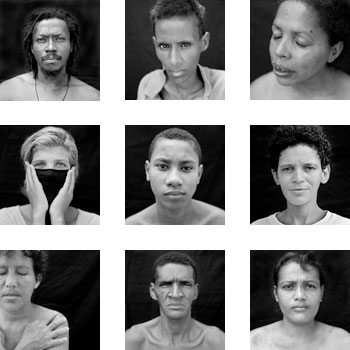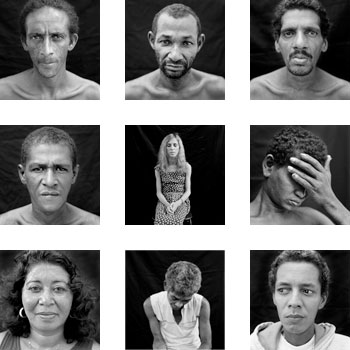-
Will to Live
AIDS Therapies and the Politics of Survival

1997

1997
- From these people
“you can learn that the human being
is always the best measure,
and that the measure of the human
is not death but life.”João Cabral de Melo Neto


- To engage the unexpected.
The inventiveness of history.  Luis, 1997“One Luis died and another one emerged.
Luis, 1997“One Luis died and another one emerged.
If death wants me, it must search for me.” Luis, 2007“Medication is me now.”
Luis, 2007“Medication is me now.” Evangivaldo, 1997“The one who is strong now must help the weaker.
Evangivaldo, 1997“The one who is strong now must help the weaker.
My politics is to see things humanly.”- Brazil was the first developing country to
universalize access to AIDS therapies.
Human rights activism and novel public-
private partnerships made this life-saving
policy possible. 

 Rose, 1997“I prostituted myself and drugged myself with
Rose, 1997“I prostituted myself and drugged myself with
the money. If I only thought then the way I think now.” Rose, 2007“I am a new creature … Yes, people are still dying
Rose, 2007“I am a new creature … Yes, people are still dying
with AIDS in the streets, but I am no longer there.”


- Beyond the technical fix.
Persistent inequalities.
The fragmentation of efforts.
The unfinished.  Nerivaldo, 1997“Why will I think about the future?”
Nerivaldo, 1997“Why will I think about the future?” Edileusa, 1997“Take me to my father’s house.”
Edileusa, 1997“Take me to my father’s house.”- The limits of surveillance.
The presence of heterogeneity.
The lives of the socially invisible.
Street patients. 



- “Medical services never meet the demands
and society has abandoned them,”
Dona Conceição told me.
“I try to alleviate things a bit.
I am tied to them in spirit.” 



- Pharmaceuticals are available.
Health infrastructures barely work.
AIDS care is outsourced to grassroots
services like Caasah. 



 Celeste, Caasah’s Director“With time, we domesticated them. We showed them
Celeste, Caasah’s Director“With time, we domesticated them. We showed them
the importance of using medication. Now they fight for their lives.”
 Edimilson, 1997“In Caasah we don’t just have AIDS—we have God.”
Edimilson, 1997“In Caasah we don’t just have AIDS—we have God.” Soraia, 1997“My image will burn the negative …
Soraia, 1997“My image will burn the negative …
Men took me by force . My parents are dead .
Too much medication.”

-
To think of life in terms of limits
and crossroads.
The right to a future.  Evilásio, 2001“My viral load decreasing, I can say that I am well,
Evilásio, 2001“My viral load decreasing, I can say that I am well,
right? I dream to finish my shack. I am saving to buy
the windows.” Valquirene, 1997“To have HIV is like not having money …
Valquirene, 1997“To have HIV is like not having money …
I want my son to study, to be a great man—then I can die.” Tiquinho, 2001“I think that when I die, I will go to a beautiful place.”
Tiquinho, 2001“I think that when I die, I will go to a beautiful place.”
2005

2005
- AIDS survivors live in flux,
between-times, between-spaces,
scavenging for resources.
Some have engineered fragile
islands of hospitality to
inhabit their unexpected lives.  Luis, 2007I do prevention work and I am dating. I adopted an AIDS orphan … The world presents all possible paths, but it is up to me to take life forward.
Luis, 2007I do prevention work and I am dating. I adopted an AIDS orphan … The world presents all possible paths, but it is up to me to take life forward. Rose, 2007“Caasah saved me. The government gave me a shack.
Rose, 2007“Caasah saved me. The government gave me a shack.
I live a normal life, struggling to pay the bills, raising my children. I am mother and father.” Evangivaldo, 2007“I always take my drugs, even if I only have coffee
Evangivaldo, 2007“I always take my drugs, even if I only have coffee
in my stomach … I feel defenseless without a job.
It is the financial part of life that tortures me.”- Health policies need to be directed
at people, not simply disease.  Evangivaldo, 2007“To have a dignified life and to be healthy to see
Evangivaldo, 2007“To have a dignified life and to be healthy to see
Juliana grow. That’s what I say.”- The force of immanence.
A language of hope.
In the field, the unexpected happens everyday and new causal relations
come into view. The deployment of categories that are important in human
experience can make our science more realistic and, we hope, better.